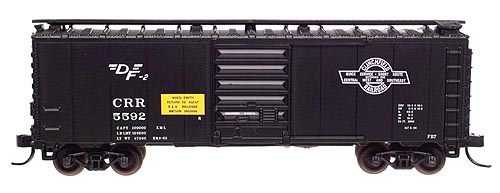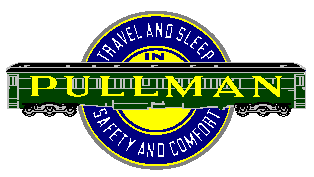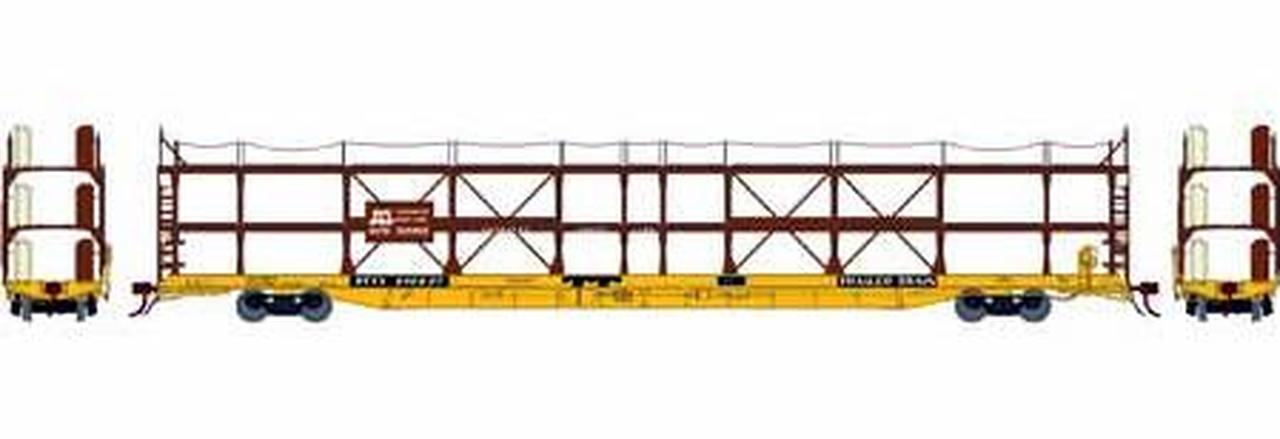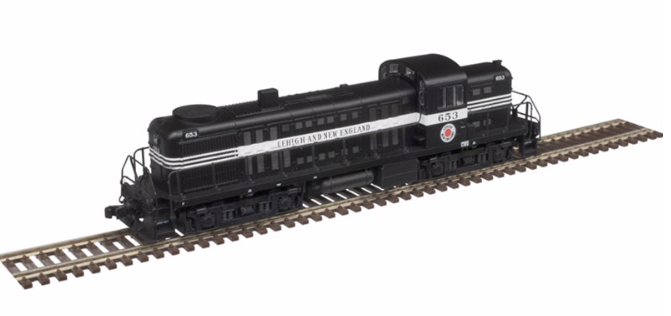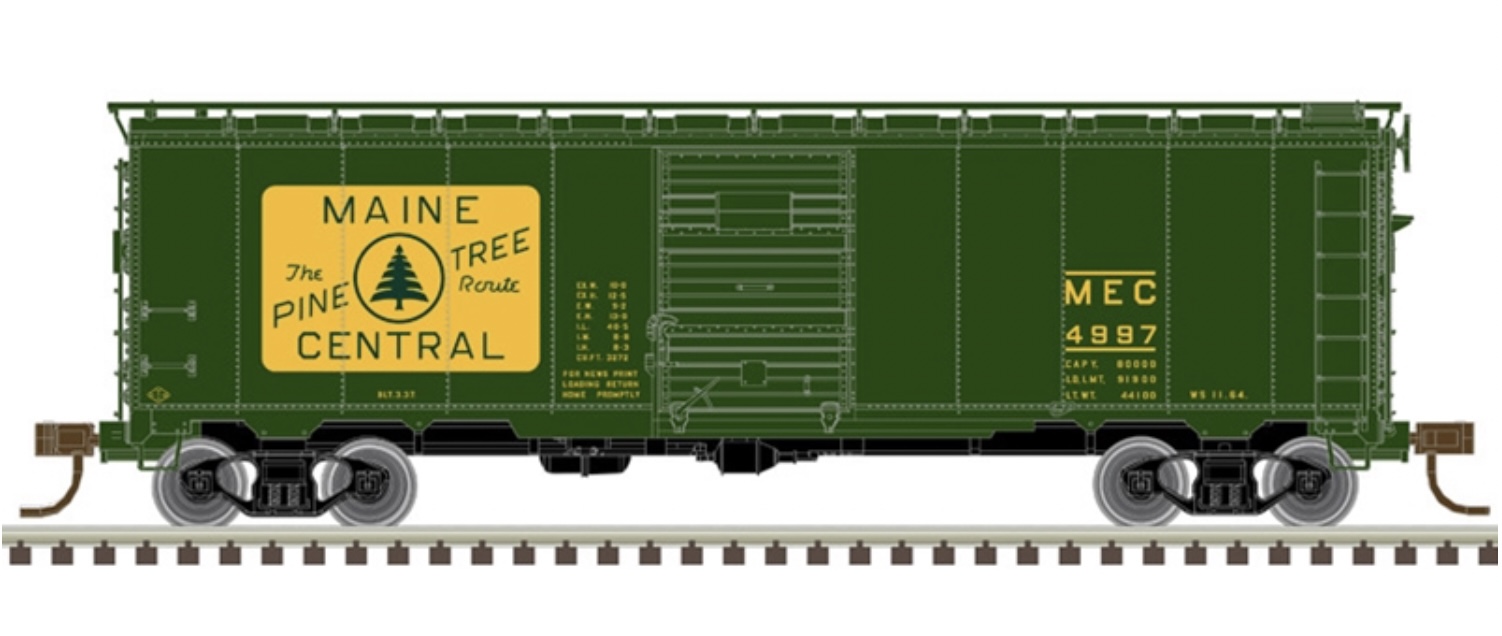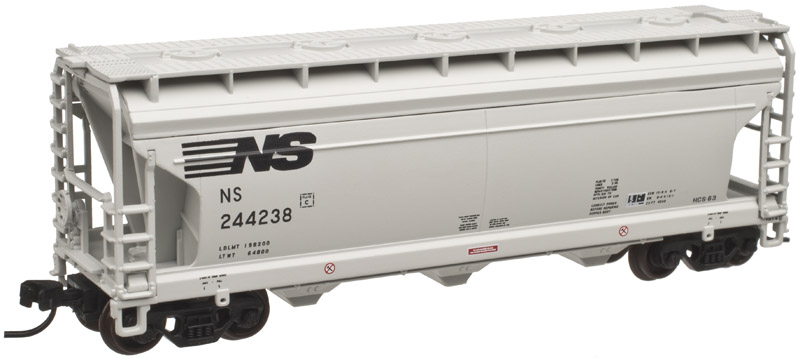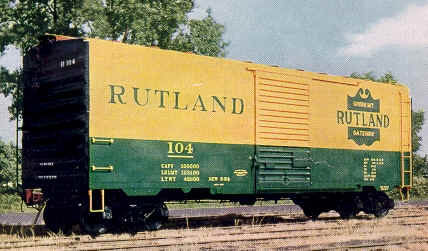Model Information: This tooling was introduced by Atlas in 1976. It replaced the earlier (and very similar) model from Roco of Austria that had been imported by Atlas from 1967 until 1975. Initial production was at the New Jersey factory. Production was later moved to China. As of 2017, this model is now very long in the tooth, so recent releases have been classified as 'Trainman' (budget) product line. Newer versions come equipped with Accumate couplers. This model should not be confused with the much newer 'Master' PS-1 boxcar from Atlas which is a completely different tooling.
Similar to other Atlas models of the 1970s and 1980s, this tooling originally featured Rapido Couplers and deep-flange nickel-silver plated wheels. When production moved to China, they started appearing with plastic low-profile wheels and Accumate couplers.
Sometime after 2005, Atlas created a 'Master' version of this model, and downgraded this tooling to the "Trainman" line. The new tooling was a complete redo of the model and has body mounted couplers, metallic wheels and excellent detailing, especially of the underframe. Since these are also marketed as 'PS-1' boxcars, it can be confusing. That tooling, however is different enough that we associate those cars with a different body style.
Similar to other Atlas models of the 1970s and 1980s, this tooling originally featured Rapido Couplers and deep-flange nickel-silver plated wheels. When production moved to China, they started appearing with plastic low-profile wheels and Accumate couplers.
Sometime after 2005, Atlas created a 'Master' version of this model, and downgraded this tooling to the "Trainman" line. The new tooling was a complete redo of the model and has body mounted couplers, metallic wheels and excellent detailing, especially of the underframe. Since these are also marketed as 'PS-1' boxcars, it can be confusing. That tooling, however is different enough that we associate those cars with a different body style.
Prototype History: The 40' Boxcar is widely known as one of the most popular freight cars used by railroads as they transitioned from steam to diesel. In particular the Pullman Standard or PS-1 design was one of the most popular and was widely used by North American railroads. These boxcars were built beginning in 1947 and share the same basic design, with certain elements such as door size, door style or roof type varying among the different railroads and production years. When production of these cars ceased in 1963, over 100,000 had been produced.
So just what is a PS-1? Well the simple answer is it is any boxcar built by Pullman Standard from 1947 on. The design changed over the years – sometimes subtly, sometimes for customer request, and sometimes in a larger way. In general, most PS-1’s built from 1947 to 1961 share the same dimensions and basic construction techniques. These cars all had a length of 40′, a height of 10’5″ or 10’6″, welded sides and ends and roof of Pullman’s own design. The greatest variation was in the size and style of doors used. Pullman Standard also offered 50′ and later 60′ boxcars – also with the PS-1 designation.
So just what is a PS-1? Well the simple answer is it is any boxcar built by Pullman Standard from 1947 on. The design changed over the years – sometimes subtly, sometimes for customer request, and sometimes in a larger way. In general, most PS-1’s built from 1947 to 1961 share the same dimensions and basic construction techniques. These cars all had a length of 40′, a height of 10’5″ or 10’6″, welded sides and ends and roof of Pullman’s own design. The greatest variation was in the size and style of doors used. Pullman Standard also offered 50′ and later 60′ boxcars – also with the PS-1 designation.
Road Name History: 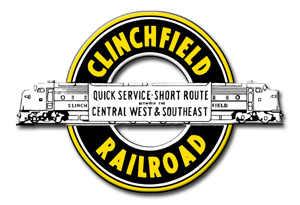 The Clinchfield Railroad (reporting mark CRR) was an operating and holding company for the Carolina, Clinchfield and Ohio Railway (reporting mark CCO). The line ran from the coalfields of Virginia and Elkhorn City, Kentucky, to the textile mills of South Carolina. The 35-mile segment from Dante, Virginia, to Elkhorn City, opening up the coal lands north of Sandy Ridge Mountains and forming a connection with the Chesapeake and Ohio Railway at Elkhorn City, was completed in 1915.
The Clinchfield Railroad (reporting mark CRR) was an operating and holding company for the Carolina, Clinchfield and Ohio Railway (reporting mark CCO). The line ran from the coalfields of Virginia and Elkhorn City, Kentucky, to the textile mills of South Carolina. The 35-mile segment from Dante, Virginia, to Elkhorn City, opening up the coal lands north of Sandy Ridge Mountains and forming a connection with the Chesapeake and Ohio Railway at Elkhorn City, was completed in 1915.
The Clinchfield was the last Class I railroad built in the U.S. east of the Rocky Mountains. The 266-mile railroad provided access to numerous scenic wonders of the Appalachian region and is probably best known for the state-of-the-art railroad engineering techniques applied in its construction, as exemplified by the Clinchfield Loops climbing the Blue Ridge Mountains north of Marion, North Carolina.
The Clinchfield Railroad began operating the line December 1, 1924, and for many years it was leased jointly by the Atlantic Coast Line Railroad and Louisville and Nashville Railroad. When the L&N merged with the ACL's successor, the Seaboard Coast Line Railroad, effective January 1, 1983, forming the Seaboard System Railroad, the separate operating company was unnecessary and was merged into the Seaboard. The line is now owned and operated by CSX Transportation as their Blue Ridge Subdivision (Spartanburg to Erwin, Tennessee) and Kingsport Subdivision (Erwin to Elkhorn City).
On October 15, 2015 CSX Transportation announced it was closing the Erwin yard facility, with a loss of 300 jobs. All through traffic trains would cease using the Clinchfield Route. Industries around Kingsport and Johnson City, TN would still be serviced by trains coming North from Spartanburg, SC and Bostic, NC, as would the Alpha Natural Resources coal preparation facility in McClure, VA by trains coming south from Shelbiana, Ky. Norfolk Southern would still use the line from St. Paul to Frisco, VA via a trackage rights arrangement with the CSX. The line between St. Paul and McClure (19.4 miles) would be idled immediately, effectively ending the use of the Clinchfield Route as a functioning bridge route between Spartanburg and Elkhorn City. It has been reported, however, that there have been instances of equipment running between Shelbiana, Ky and Dante, Va. The last time a train crossed the entire "North End" of the Clinchfield Route (from Elkhorn to Kingsport) was for the 2015 running of the Santa Claus Special, which happened in November 2015. It remains unclear as to the future of this rail line.

The Clinchfield was the last Class I railroad built in the U.S. east of the Rocky Mountains. The 266-mile railroad provided access to numerous scenic wonders of the Appalachian region and is probably best known for the state-of-the-art railroad engineering techniques applied in its construction, as exemplified by the Clinchfield Loops climbing the Blue Ridge Mountains north of Marion, North Carolina.
The Clinchfield Railroad began operating the line December 1, 1924, and for many years it was leased jointly by the Atlantic Coast Line Railroad and Louisville and Nashville Railroad. When the L&N merged with the ACL's successor, the Seaboard Coast Line Railroad, effective January 1, 1983, forming the Seaboard System Railroad, the separate operating company was unnecessary and was merged into the Seaboard. The line is now owned and operated by CSX Transportation as their Blue Ridge Subdivision (Spartanburg to Erwin, Tennessee) and Kingsport Subdivision (Erwin to Elkhorn City).
On October 15, 2015 CSX Transportation announced it was closing the Erwin yard facility, with a loss of 300 jobs. All through traffic trains would cease using the Clinchfield Route. Industries around Kingsport and Johnson City, TN would still be serviced by trains coming North from Spartanburg, SC and Bostic, NC, as would the Alpha Natural Resources coal preparation facility in McClure, VA by trains coming south from Shelbiana, Ky. Norfolk Southern would still use the line from St. Paul to Frisco, VA via a trackage rights arrangement with the CSX. The line between St. Paul and McClure (19.4 miles) would be idled immediately, effectively ending the use of the Clinchfield Route as a functioning bridge route between Spartanburg and Elkhorn City. It has been reported, however, that there have been instances of equipment running between Shelbiana, Ky and Dante, Va. The last time a train crossed the entire "North End" of the Clinchfield Route (from Elkhorn to Kingsport) was for the 2015 running of the Santa Claus Special, which happened in November 2015. It remains unclear as to the future of this rail line.
Brand/Importer Information: In 1924 Stephan Schaffan, Sr. founded the Atlas Tool Company in Newark, New Jersey. In 1933 his son, Stephan Schaffan, Jr., came to work for his father at the age of sixteen. Steve Jr. built model airplanes as a hobby and frequented a local hobby shop. Being an enterprising young man, he would often ask the owner if there was anything he could do to earn some extra spending money. Tired of listening to his requests, the hobby-store owner threw some model railroad track parts his way and said, "Here, see if you can improve on this".
In those days, railroad modelers had to assemble and build everything from scratch. Steve Jr. created a "switch kit" which sold so well, that the entire family worked on them in the basement at night, while doing business as usual in the machine shop during the day.
Subsequently, Steve Jr. engineered the stapling of rail to fiber track, along with inventing the first practical rail joiner and pre-assembled turnouts and flexible track. All of these products, and more, helped to popularize model railroading and assisted in the creation of a mass-market hobby. The budding entrepreneur quickly outgrew the limitations of a basement and small garage operation. Realizing they could actually make a living selling track and related products, Steve and his father had the first factory built in Hillside, New Jersey at 413 Florence Avenue in 1947. On September 30, 1949, the Atlas Tool Company was officially incorporated as a New Jersey company.
In 1985, Steve was honored posthumously for his inventions by the Model Railroad Industry Association and was inducted into the Model Railroad Industry Hall of Fame in Baltimore, Maryland. In addition, Steve was nominated and entered into the National Model Railroad Association Pioneers of Model Railroading in 1995.
In the early 1990s, the Atlas Tool Company changed its name to Atlas Model Railroad Company, Inc.
In those days, railroad modelers had to assemble and build everything from scratch. Steve Jr. created a "switch kit" which sold so well, that the entire family worked on them in the basement at night, while doing business as usual in the machine shop during the day.
Subsequently, Steve Jr. engineered the stapling of rail to fiber track, along with inventing the first practical rail joiner and pre-assembled turnouts and flexible track. All of these products, and more, helped to popularize model railroading and assisted in the creation of a mass-market hobby. The budding entrepreneur quickly outgrew the limitations of a basement and small garage operation. Realizing they could actually make a living selling track and related products, Steve and his father had the first factory built in Hillside, New Jersey at 413 Florence Avenue in 1947. On September 30, 1949, the Atlas Tool Company was officially incorporated as a New Jersey company.
In 1985, Steve was honored posthumously for his inventions by the Model Railroad Industry Association and was inducted into the Model Railroad Industry Hall of Fame in Baltimore, Maryland. In addition, Steve was nominated and entered into the National Model Railroad Association Pioneers of Model Railroading in 1995.
In the early 1990s, the Atlas Tool Company changed its name to Atlas Model Railroad Company, Inc.
Item created by: Emily on 2016-10-16 17:01:51. Last edited by gdm on 2020-06-05 11:47:57
If you see errors or missing data in this entry, please feel free to log in and edit it. Anyone with a Gmail account can log in instantly.
If you see errors or missing data in this entry, please feel free to log in and edit it. Anyone with a Gmail account can log in instantly.


